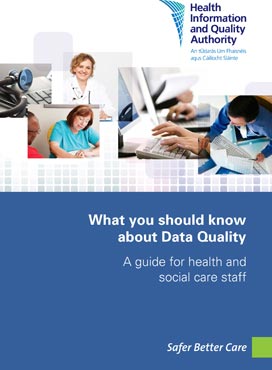Ensuring data quality is the responsibility of all health and social care staff – not just the clinical staff, data quality manager, the records management team or the IT department, writes Professor Jane Grimson, Director of Health Information and Deputy Chief Executive of HIQA.
The Health Information and Quality Authority has published What you should know about Data Quality, a useful guide for front-line health and social care staff aimed at raising awareness about the importance of data quality as part of the day-to-day provision of safe and effective services. The guide is available on www.hiqa.ie and 10,000 copies have been distributed to staff throughout the country.
 So what is data quality? It is about having confidence in the quality of the data that you record and use. Data can be in numerous formats, such as words, images, and graphics that once processed or analysed to produce something useful, become information. Data can be said to be of good quality when it does what it is needed to do, such as test results helping to inform a decision on treatment.
So what is data quality? It is about having confidence in the quality of the data that you record and use. Data can be in numerous formats, such as words, images, and graphics that once processed or analysed to produce something useful, become information. Data can be said to be of good quality when it does what it is needed to do, such as test results helping to inform a decision on treatment.
Safer, more reliable health and social care depends on access to and use of quality data. It is important to ensure that the recording of care and services adheres to the relevant legislation, standards and professional codes of practice. The quality of a service user’s personal health and social care data informs all aspects of their care, including associated costs.
Poor data quality has a substantial impact on the safety of service users, and there are also financial implications. Therefore, ensuring data quality is the responsibility of all health and social care staff – not just the clinical staff, data quality manager, the records management team or the IT department. The new HIQA booklet attempts to explain in clear language how to go about achieving this. The booklet gives examples of how to achieve data that is accurate, complete, legible, timely, and relevant, amongst the other factors which determine data quality.
It is important that health and social care staff know how they can contribute to improving data quality where they work; support and encourage colleagues and create an environment for data quality improvements; and maintain documentation that is clear, concise and comprehensive. In turn, how do staff benefit from data quality? There are numerous benefits, such as helping in the coordination of care with your colleagues.
The HIQA booklet sets out what an organisation can do to make data quality a success, through leadership and management, policies and procedures, training, and data quality audits amongst other means.
Other benefits include:
- Supporting colleagues to deliver safe, high quality care.
- Ensuring they meet legal requirements and professional standards.
- Supporting the provision of data for clinical and audit initiatives, and supporting decision making within their organisation and nationally.
- Providing data for health and social care research.
- Providing an accurate picture of care and good documentary evidence of work done.
While poor collection and management of information places a burden on the health and social care system, collecting the information should not impose an additional burden on the service. It should be collected as a routine part of the job. Management should drive data quality initiatives. The HIQA booklet sets out what an organisation can do to make data quality a success, through leadership and management, policies and procedures, training, and data quality audits amongst other means.
Correct and up-to-date data is critical, not only for the provision of high quality clinical and social care, but also for people’s continuing care. In the long run, it also crucial for research, strategic planning, management and funding of health and social care services. Getting the data collection right is important because the various people who will use the data (with the appropriate confidentiality safeguards in place) must have confidence in it. A lack of confidence in the data results in the loss of opportunities to improve data quality, ultimately undermining opportunities for service improvement.
To help organisations meet these challenges, seven essential elements for improving data quality and making it a success are highlighted in the booklet. It will help organisations to reap the many benefits of having a culture of good quality data being embedded at all levels of the health and social care system.

